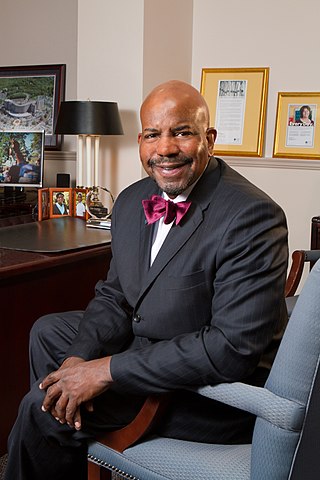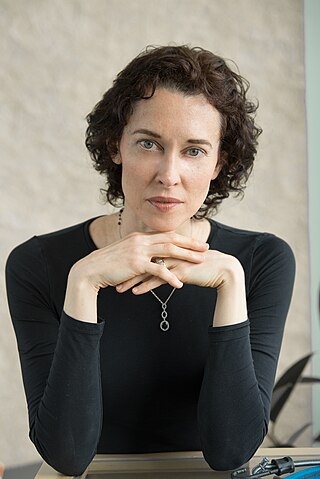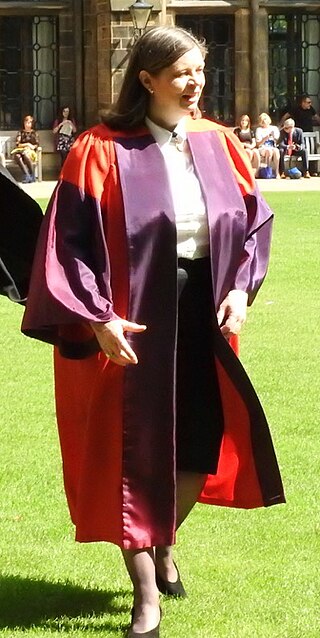Related Research Articles

Cato T. Laurencin FREng SLMH is an American engineer,physician,scientist,innovator and a University Professor of the University of Connecticut.

Nicholas (Nikolaos) A. Peppas is a chemical and biomedical engineer whose leadership in biomaterials science and engineering,drug delivery,bionanotechnology,pharmaceutical sciences,chemical and polymer engineering has provided seminal foundations based on the physics and mathematical theories of nanoscale,macromolecular processes and drug/protein transport and has led to numerous biomedical products or devices.

Raphael Lee is an American plastic and reconstructive surgeon,biomedical engineer and inventor. He is the Paul and Allene Russell Distinguished Service Professor Emeritus at the University of Chicago and Director of Renacyte BioMolecular Technologies,Inc.

Linda Gay Griffith is an American biological engineer,and Professor of Biological Engineering and Mechanical Engineering at Massachusetts Institute of Technology,where she also directs the Center for Gynepathology Research.
Kristi S. Anseth is the Tisone Distinguished Professor of Chemical and Biological Engineering,an Associate Professor of Surgery,and a Howard Hughes Medical Investigator at the University of Colorado at Boulder. Her main research interests are the design of synthetic biomaterials using hydrogels,tissue engineering,and regenerative medicine.

Gordana Vunjak-NovakovicFRSC is a Serbian American biomedical engineer and university professor. She is a University Professor at Columbia University,as well as the Mikati Foundation Professor of Biomedical Engineering and Medical Sciences. She also heads the laboratory for Stem Cells and Tissue Engineering at Columbia University. She is part of the faculty at the Irving Comprehensive Cancer Center and the Center for Human Development,both found at Columbia University. She is also an honorary professor at the Faculty of Technology and Metallurgy at the University of Belgrade,an honorary professor at the University of Novi Sad,and an adjunct professor at the Department of Biomedical Engineering at Tufts University.
Melody A. Swartz is a professor and vice dean for faculty affairs at the University of Chicago who pioneered research in engineering complex tissues. Her most cited work "Capturing complex 3D tissue physiology in vitro" has been cited over 1784 times. Her research is focused on understanding the role of the lymphatic system regulating immunity in homeostasis and diseases,particularly cancer. She was previously director of the Institute of Bioengineering at the École Polytechnique Fédérale de Lausanne. She was elected to the National Academy of Engineering in 2023,the Royal Academy of Medicine of Belgium in 2023,and the National Academy of Medicine in 2020.

Juan J. de Pablo,a chemical engineer,is the executive dean of the New York University Tandon School of Engineering and the University’s inaugural executive vice president for global science and technology. He assumed those posts on October 1,2024. Prior to that,he was Liew Family professor in the Pritzker School of Molecular Engineering at the University of Chicago and has served as senior scientist at Argonne National Laboratory. In 2018,he was appointed Vice President for National Laboratories at the University of Chicago,a title which later expanded to include Science Strategy,Innovation and Global Initiatives in 2020. In 2021,he became Executive Vice President for Science,Innovation,National Laboratories and Global Initiatives at the University of Chicago. He is known for his research on the thermophysical properties of soft materials and was the co-director of the NIST supported Center for Hierarchical Materials Design (CHIMaD). and director of the UW-Madison Materials Research Science and Engineering Center (MRSEC). He was elected a member of the National Academy of Sciences in 2022.

Carl H. June is an American immunologist and oncologist. He is currently the Richard W. Vague Professor in Immunotherapy in the Department of Pathology and Laboratory Medicine at the Perelman School of Medicine of the University of Pennsylvania. He is most well known for his research on T cell therapies for the treatment of several forms of cancers. In 2020 he was elected to the American Philosophical Society.

Jennifer Hartt Elisseeff is an American biomedical engineer,ophthalmologist and academic. She is the Morton Goldberg Professor and Director of the Translational Tissue Engineering Center at Johns Hopkins Department of Biomedical Engineering and the Wilmer Eye Institute with appointments in Chemical Engineering,Biomedical Engineering,Materials Science and Orthopedic Surgery. Elisseeff's research is in the fields of regenerative medicine and immunoengineering.

Kathleen Elizabeth Tanner is the Bonfield Professor of Biomedical Materials at Queen Mary University of London. Her research focusses on developing materials with particular biological and mechanical properties for use medicine,particularly those used for bone replacement. Tanner developed HAPEX,a bone mineral composite biomaterial,which was used in over half a million middle ear transplants in the 1990s.
Laura Elizabeth Niklason is a physician,professor and internationally recognized researcher in vascular and lung tissue engineering. She is the Nicholas M. Greene Professor of Anesthesiology and Biomedical Engineering at Yale University and co-founder,chief executive officer and president of Humacyte,a regenerative medicine company developing bioengineered human tissues.
The Pritzker School of Molecular Engineering (PME) is the first school of engineering at the University of Chicago. It was founded as the Institute for Molecular Engineering in 2011 by the university in partnership with Argonne National Laboratory. When the program was raised to the status of a school in 2019,it became the first school dedicated to molecular engineering in the United States. It is named for a major benefactor,the Pritzker Foundation.

Joyce Y. Wong is an American engineer who is Professor of Biomedical Engineering and Materials Science and Engineering at Boston University. Her research develops novel biomaterials for the early detection treatment of disease. Wong is the Inaugural Director of the Provost's Initiative to promote gender equality and inclusion in STEM at all levels:Advance,Recruit,Retain and Organize Women in STEM. She is a Fellow of the American Association for the Advancement of Science,American Institute for Medical and Biological Engineering and Biomedical Engineering Society.

Matthias Lutolf is a bio-engineer and a professor at EPFL where he leads the Laboratory of Stem Cell Bioengineering. He is specialised in biomaterials,and in combining stem cell biology and engineering to develop improved organoid models. In 2021,he became the scientific director for Roche's Institute for Translation Bioengineering in Basel.
Adekunle O. Odunsi is an American gynecologic oncologist. In 2021,Odunsi became the director of the University of Chicago Comprehensive Cancer Center.
Kiana Aran is a biomedical entrepreneur and Associate Professor at both UC San Diego's School of Medicine and UC San Diego's Jacobs School of Engineering in the Department of Bioengineering. She is also the Chief Innovation Officer at Paragraf Ltd. Paragraf,a UK-based semi-conductor company,acquired Cardea Bio Inc.,which she co-founded and ran as the Chief Science Offer. She has also helped co-found CRISPR QC Inc. that offers a CRISPR Analytics Platform that helps pharma and biotech companies optimize their gene editing research. Her overall research and inventions are focused around developing technologies and bioelectronics for multi-omics studies and applications,especially when they enable products and technologies for studying the mechanisms of healthy aging. She became known as the pioneer of fusing CRISPR and electronics,resulting in the CRISPR-chip technology that is being used to improve the quality of genotyping and gene editing. She was awarded the 2021 Nature –Estée Lauder Research Award for Inspiring Women in Science.
Tatiana Segura is an American biomedical engineer who is a professor at Duke University. Her research considers biomedical engineering solutions to promote cell growth. She was elected Fellow of the American Institute for Medical and Biological Engineering in 2017 and awarded the Acta Biomaterialia Silver Medal in 2021.

Nicole F. Steinmetz is a German–American biomedical engineer. She is a Full Professor in Biomaterials at the University of California,San Diego and Founding Director of the Center for Nano-ImmunoEngineering (nanoIE). Her research earned her Fellowship nominations from the American Institute for Medical and Biological Engineering,Biomedical Engineering Society,and National Academy of Inventors. Steinmetz uses various plant viruses to assist with drug delivery,molecular imaging,and vaccines.
Ankur Singh is an Indian-American biomedical engineer and scientist whose research focuses on engineering immune system. He is a Carl Ring Family Endowed Professor at Georgia Institute of Technology in the George W. Woodruff School of Mechanical Engineering and Wallace H. Coulter Department of Biomedical Engineering. He serves as the Director of the Center for Immunoengineering at Georgia Tech.
References
- ↑ "Jeffrey Hubbell". University of Chicago. Retrieved June 11, 2021.
- ↑ Hubbell, J. A.; McIntire, L. V. (November 1986). "Platelet active concentration profiles near growing thrombi. A mathematical consideration". Biophysical Journal. 50 (5): 937–945. doi:10.1016/S0006-3495(86)83535-4. ISSN 0006-3495. PMC 1329819 . PMID 3790695.
- 1 2 "UChicago faculty members receive named, distinguished service professorships". University of Chicago. November 11, 2014. Retrieved June 14, 2021.
- ↑ Borzo, Greg (May 9, 2017). "Jeffrey Hubbell honored for landmark biomaterials research". University of Chicago. Retrieved June 14, 2021.
- ↑ "Jeffrey Hubbell, recipient of the 2018 Acta Biomaterialia Gold Medal". Materials Today. November 3, 2017. Retrieved June 14, 2021.
- ↑ "Jeffrey Hubbell named inaugural Bell Professor in Tissue Engineering". University of Chicago. June 15, 2017. Retrieved June 14, 2021.
- ↑ "JEFFREY HUBBELL, PH.D." American Institute for Medical and Biological Engineering. Retrieved June 14, 2021.
- ↑ "Professor Jeffrey Alan Hubbell". NAE Website. Retrieved 2024-10-19.
- ↑ Reiter, Carla (October 27, 2016). "Scientist builds drug development company out of research lab". University of Chicago. Retrieved June 14, 2021.
- ↑ "Jeffrey Hubbell named to National Academy of Medicine". University of Chicago. October 19, 2018. Retrieved June 14, 2021.
- ↑ Ayshford, Emily (February 1, 2019). "New vaccine for malaria developed at IME could be more effective". University of Chicago. Retrieved June 14, 2021.
- ↑ "Eight UChicago faculty elected to American Academy of Arts and Sciences". University of Chicago. April 23, 2021. Retrieved June 14, 2021.
- ↑ "National Academy of Sciences Elects Members and International Members - NAS". www.nasonline.org/. Retrieved 2024-10-19.
- ↑ "Jeffrey Alan Hubbell – NAS". www.nasonline.org/. Retrieved 2024-10-19.
- ↑ "National Academy of Inventors announces 2014 NAI Fellows". National Academy of Inventors. Retrieved June 14, 2021.
- ↑ Wilson, D. Scott; Damo, Martina; Hirosue, Sachiko; Raczy, Michal M.; Brünggel, Kym; Diaceri, Giacomo; Quaglia-Thermes, Xavier; Hubbell, Jeffrey A. "Synthetically glycosylated antigens induce antigen-specific tolerance and prevent the onset of diabetes". Nature Biomedical Engineering. 3 (10): 817–829. doi:10.1038/s41551-019-0424-1. ISSN 2157-846X. PMID 31358881.
- ↑ Tremain, Andrew C.; Wallace, Rachel P.; Lorentz, Kristen M.; Thornley, Thomas B.; Antane, Jennifer T.; Raczy, Michal R.; Reda, Joseph W.; Alpar, Aaron T.; Slezak, Anna J.; Watkins, Elyse A.; Maulloo, Chitavi D.; Budina, Erica; Solanki, Ani; Nguyen, Mindy; Bischoff, David J. "Synthetically glycosylated antigens for the antigen-specific suppression of established immune responses". Nature Biomedical Engineering. 7 (9): 1142–1155. doi:10.1038/s41551-023-01086-2. ISSN 2157-846X. PMID 37679570.
- ↑ "Scott Wilson". Johns Hopkins Biomedical Engineering. Retrieved 2024-10-20.
- ↑ "Jun Ishihara". Ishihara laboratory - Imperial College London. Retrieved 2024-10-20.
- ↑ Ayshford, Emily (April 30, 2020). "Breakthrough helps fight 'cold' tumors that don't respond to immunotherapy". University of Chicago. Retrieved June 14, 2021.
- ↑ Ayshford, Emily (October 12, 2020). "UChicago researchers find way to improve multiple sclerosis treatment". University of Chicago. Retrieved June 14, 2021.
- 1 2 Communications, NYU Web. "NYU Launches New Cross-Institutional Initiative to Advance Engineering and Health". www.nyu.edu. Retrieved 2024-11-15.